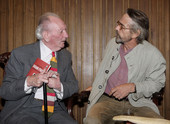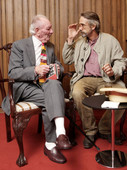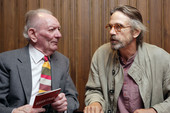Trio of events celebrate gift of Friel’s ‘magnificent plays’







DEIRDRE FALVEY, Arts Editor
BRIAN FRIEL doesn’t go in much for public speaking. And if he was going to make a speech, this past weekend, one of the focal points of his 80th birthday year, was probably going to be the occasion.
Friel spoke entertainingly and at uncharacteristic length on Saturday night but, more characteristically, placed the emphasis on someone other than himself.
The week just past featured rehearsed readings of three plays he chose from the Abbey’s repertoire, the opening of the three Gate/Friel productions in Dublin, following their Sydney and Edinburgh festival triumphs, and his handprints were taken on Friday to be cast in bronze for display at the Gaiety Theatre Plaza.
The Gate organised a thank you party for about 100 people at the Unicorn restaurant on Saturday and last night there was a glitzy tribute at the Abbey.
There have been quite a few celebrations in this birthday year, Friel acknowledged on Saturday night, so much so that “I now think I’m pushing 83”.
He mentioned the readings during the week, and “the hooley” tomorrow, “and I’m grateful to Fiach for that. Michael Colgan rowed in and did three full productions. Some few people have difficulty with Michael,” he continued, to loud laughter from the assembled. “They all think perhaps that Michael is a bit too much. I don’t think so. And Anne [Friel] doesn’t think so.” And he thanked Colgan for the “friendship and support and fealty” he has given him.
Then he said he wanted to remind people that this Faith Healer was “directed by a man we’ll refer to as the Scottish director,” [Robin Lefevre is credited as director of the play in the Gate programme]. “And when the Scottish director disappeared, Mr Colgan took over and did an excellent job.” So Friel suggested there might be an “uneasy spectacle” when “the best producer in the country might become the best director in the country, and would be damn near unbearable”.
Friel’s actual birthday was in January, and Colgan said “it’s safe to say his birthday is well and truly done and dusted. ‘A finished thing’,” quoting Grace Harvey in Faith Healer . So the party was to say thank you to Brian Friel, for the “many reasons we have to be grateful” to him: “for his relish of language, his loathing of sentimentality, his glorious irreverence, his keen avoidance of the amateur, his unquestioned integrity, his unswerving loyalty to the work, his hungry eye, his steadfast ability to hold a grudge, his generosity even with his cigars (and they’re expensive ones too), his late-night gossip, his perfectly timed acts of kindness, his private standards of excellence and above all, we are grateful for the gift of his magnificent plays and the opulence of his words.”
The party was starry, and among those packed into the restaurant were Ian McKellan, Jeremy Irons, Sinéad Cusack, Seamus Heaney, John McColgan, Moya Doherty, Gay Byrne and Kathleen Watkins, Harry Crosbie, Mike Murphy, Edna O’Brien, Tom Kilroy and Conor McPherson.
The tribute event last night at the Abbey was hosted by Sinéad Cusack and directed by Patrick Mason.
Friel’s association with the Abbey goes back to 1962 when The Enemy Within was produced, the first of eight world premieres of his at the national theatre. The tribute featured excerpts from Dancing at Lughnasa (featuring the original cast of Mundy sisters – Rosaleen Linehan, Anita Reeves, Brid Brennan, Catherine Byrne and Bríd Ní Neachtain), Philadelphia Here I Come , and Translations , with the other casts also including Ciaran Hinds, Eamon Morrissey, Des Cave, Charlie Bonner and Darragh Kelly.
Music ranging from Cole Porter to John Field – performed by John O’Conor, Conor Linehan, Cora Venus Lunny and soprano Celine Byrne – was central to the evening and emblematic of the role of music in his work. And the surprise of the night was special tributes from Seamus Heaney and Tom Kilroy.
This article appears in the print edition of the Irish Times
_________________________________________________________________________________________
‘Many more years, Brian’
DEIRDRE FALVEY – Irishtimes.com
The Abbey’s 80th birthday tribute to Brian Friel was a celebration of his work and life that featured words, plays and above all music
HAD THE PHOTOGRAPHER engineered it? There was Brian Friel sitting upstairs at the Abbey chatting with an eccentrically hatted Jeremy Irons (looking very A Month in the Country , or like a Beckett character). All around them milled theatre folk, there for the Abbey’s birthday tribute night for Friel, MC-d by actor (and Irons’s wife) Sinead Cusack. On second thoughts, surely no one could set those two gentlemen up for a scene like that.
Onstage, with backdrop from The Rivals set – an enormous painting of the big house, very suitable for the evening – and a large piano centre stage, there was an elegance and a formality to the beautifully composed and moving evening, drawn together by director Patrick Mason, who also scripted Cusack’s Canticle for Master Friel .
“The tools that are available to the playwright to tell his story are few enough – words, action, silence. In the theatre that has engaged me words are at the very core of it all. But the playwrights’ words aren’t written for solitary engagement – they are written for public utterance. So unlike the words of the novelist or poet, they are scored in altogether different keys, and in altogether different tempi. And it is with this score that the playwright and the actor privately plot to work their public spell.” Cusack thus animatedly quoted the great spell-master himself to start, “to create our own ‘public canticle’, to honour the achievement of this most meticulous and accomplished of playwrights”.
There were words, there were the plays, and above all there was the music.
Playwright Tom Kilroy invoked the name of Chekhov, and spoke about how both playwrights communicated so much through letters. And though he regards letters as being intended for the eyes of those to whom they are addressed – “I take my life in my hands”– he read from a letter from Friel last year following their pilgrimage to Yalta, visiting two Chekhov homes there. Friel wrote afterwards to Kilroy about how “we did lift the veil, there certainly was a presence”, but how “there was another veil behind that and we got no further”. Kilroy said Friel might have been writing about the stage itself, “the secrets and silences, the veils and concealments, a place of mystery, which harbours the inexpressible”. He ended with a gentle “Many more years, Brian”.
Later in the evening, Seamus Heaney read four short poems related to “the work and the worker we celebrate here”, “the mastery and the mystery, the dedication and dochas”. The Stations of the West recalled his first adolescent trip to the Donegal gaeltacht, and his first experience of Friel’s county; a 12th- century poem was attributed to St Colmcille, whose name is lent to the college they both attended.
Sprinkled throughout the evening were, Cusack said, “Brians words read in what Mrs Malaprop might describe as ‘invocations’ of three of his greatest plays”.
In Philadelphia, Here I Come! an inscrutable Eamon Morrisey (reading from his own original copy of the play; the other actors on the night had uniform red-bound extracts) as SB O’Donnell to Darragh Kelly’s Gar Private, along with Rosaleen Linehan as Madge, Charlie Bonner as Gar Public and Des Cave as Canon Mick O’Byrne. There was great humour as well as pathos in the readings from it, and from Translations , which had Ciaran Hinds as Hugh to Nick Dunning’s Captain Lancey, Darragh Kelly’s Owen and Rory Nolan’s Lieutenant Yolland, also with Brid Brennan and Des Cave.
Later, the final “invocation” of the evening was Dancing at Lughnasa , a play which might be seen as his most musical (New York producers apparently suggested it might be more effectively retitled Dancin! said Cusack.)
As she called out the cast list, and particularly the Mundy sisters – Rosaleen Linehan, Anita Reeves, Brid Brennan, Catherine Byrne, Bríd Ní Neachtain, together again all these years later – there were audible intakes of breath, and whispered comments of pleasure and anticipation from the audience.
Above all it was an evening of songs and music, from the plays and as a background influence on them. Conor Linehan (piano) and Cora Venus Lunny (violin) played a selection of Jerome Kern and Cole Porter melodies from the 1930s, which animate that golden Ballybeg summer of 1936, introduce the fantastic Francis Hardy, and accompany Terry Martin and his friends on their island pilgrimage in Wonderful Tennessee : from Dancing in the Dark to Just the Way You Look Tonight, to a gorgeous Anything Goes , full of panache and fun. Later Linehan was back on the keys, accompanying soprano Celine Byrne with evocative songs from the plays, ending with a spine-tingling Oft in the Stilly Night .
And later still, there was a special appearance by pianist John O’Conor, who movingly played three nocturnes – though the third, Le Midi , O’Conor pointed out, was not strictly speaking a nocturne at all – by John Field, the Irish pianist and composer who invented the nocturne and is beloved of Friel.
The evening ended for the audience with a cake and a standing ovation for a visibly thrilled Friel, sitting beside his wife, Anne, and Abbey director Fiach MacConghail; and for the key members of the party the evening went on much later still.
This article appears in the print edition of the Irish Times
_________________________________________________________________________________________









You must be logged in to post a comment.